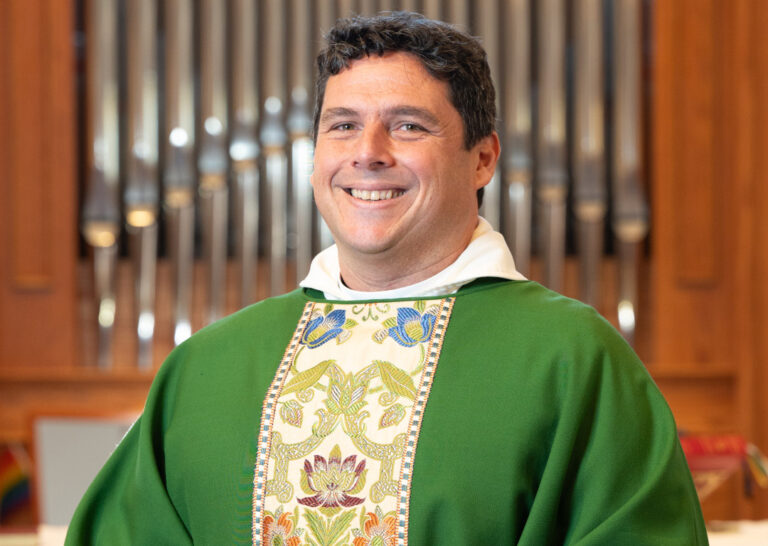by Becky Christian
“When your worlds begin to collide it’s a sign that you’re going down the right path.”
That’s how Rector Grey Maggiano explained his call to the ministry, which came after his experiences as varied as leading an international effort Afghanistan for the U.S. Department of State, gaining over ten years’ experience working with Latino congregations in Miami, and speaking about the moral responsibility around climate change, reparations and the Episcopal Church.
As a youngster, Grey was involved in his Episcopal church in a small town north of San Diego. His family moved when he was 12 to northern Virginia, which he said was a shock—he didn’t even own a pair of pants when he left sunny California!
In Virginia he continued to be active in his Episcopal youth group and made several mission trips to Latin America, which led to a strong call to service. He thought he would major in pre-med at Williams College, but after discussions with his professor, who told him a public policy major was a way to make the world better, he got a degree in public policy and Spanish literature.
He was graduated from Georgetown University with a Master of Public Policy, where his thesis was “The Economic, Social and Spiritual Impacts of Microfinance: a Look at Rural Uganda.” He was honored to be a student graduation speaker at Georgetown.
Grey says he lives by the maxim that when much is given, much is required. He thought he could do that outside of the church, but after working right out of college for El Pueblo in Raleigh and for four years in Afghanistan, he said it was only a matter of time before he realized he needed to go into the ministry. He earned an M.Div. from the Virginia Theological Seminary where he was student body president.
After completing seminary, Grey ‘s accomplishments were varied. He served St Mathew’s Episcopal Church in Sterling, VA, Trinity Episcopal Cathedral, Miami, and Memorial Episcopal Church, Baltimore. He was a trainer in Honduras, Colombia, Uganda, and Rwanda. He is a member of the Standing Committee for World Mission, where he was the lead drafter of the Report on the Impact of Colonialism on the Episcopal Church. He led successful capital campaigns, served as founder and board member of Unity Hall, Baltimore; and was honored for supporting Miami’s LGBT community.
What attracted Grey to Nativity? He said
- It’s a place where people are willing to try new things
- Nativity reaches out beyond the boundaries of the church
- People care for each other
- It’s a very collaborative community with a lot of lay leadership—not a “Father knows best” kind of parish.
- Raleigh’s growth
- Nativity’s commitment to environmental justice
“What is life-giving to clergy is a church community that has energy and wants to grow”, he said. ‘You can be weighed down by history.”
Grey describes his style of leadership as collaborative and that building relationships is important. He wants first to listen and sit with the community and learn what God is calling them to do and then to provide guidance.
“In all that we do and all that we are, where do we feel God is calling us and where do we re-direct our energy?” He said he wants to know where do people want to be in five years and where they want the parish to be. He also hopes in our ministry to move from doing to being with people of different points of view, cultures and races.
On his first Sunday Grey introduced his family. He met his wife Monica on a UNC study abroad program in Spain. Both speak Spanish fluently. Isabelle’s a student at Leesville Middle School and speaks some Spanish ; son Nicolas (no “H”) is at York elementary and would prefer to learn Japanese. Grey is a big baseball fan (Orioles and the Padres) and says because of Monica’s alma mater theirs is a Tarheel household.
For fun? Grey loves to bake all kinds of bread, something he learned during Covid to preserve his sanity, he said. He and later Monica and her mother took King Arthur Flour baking classes in Vermont. The family cooks together. “Cooking and feeding others brings us joy”.
Grey also likes to bike (it’s now easier on his knees than running). Every year he and Isabelle take a bike camping trip. He once did a 500-mile ride from Jerusalem to the Red Sea.
How does Grey want us to communicate with him? He said, “If you want me to remember something, don’t tell me on Sunday morning”. Send an email because a paper record is always helpful.
What frustrates Grey? He said when people assume he is too busy.
“Nothing is more important than being with people of Church of the Nativity. I’ll never be too busy to meet with them.”


I recently moved here from Richmond VA. St. Stephen’s Church has a Sunday night Celtic Healing service. This includes beautiful music , the congregation coming up to the alter to light candles for special intentions ,a short talk by a member of the congregation instead of a sermon( , usually about a milestone event in their lives ) ( which is pre-approved by the church ), as your coming away from the alter at communion laying on of the hands ( my favorite part ) then anointing of your forehead and hands. Have you ever been to a service like this and any possibility we could have one? I realize it’s a big request but I’ve been searching everywhere for one and I decided it doesn’t hurt to mention it. Thanks for listening.